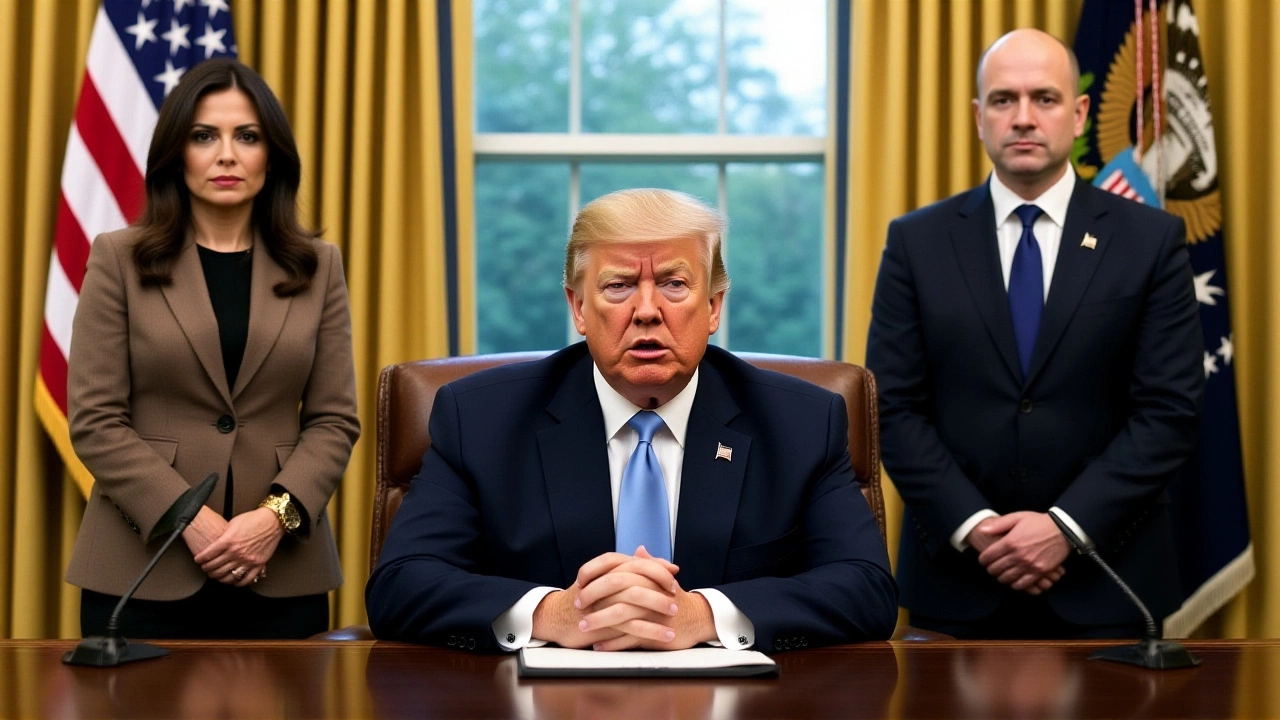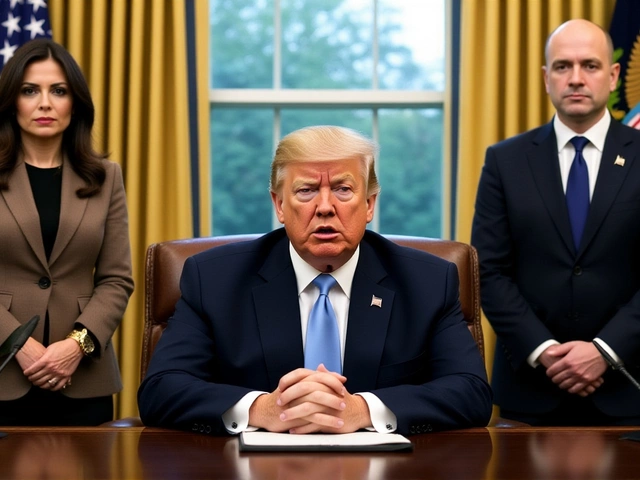When Donald John Trump stepped to the podium in the Oval Office on November 18, 2025, he didn’t just announce a new visa program—he reshaped how the world will enter the United States for the biggest sporting event in history. The U.S. Department of State, working with Fédération Internationale de Football Association (FIFA), unveiled the FIFA Priority Appointment Scheduling System (FIFA PASS), a fast-track visa interview system for ticket holders of the 2026 World Cup. But here’s the twist: it doesn’t guarantee entry. It just gets you to the front of the line—where the same intense scrutiny still waits.
What FIFA PASS Actually Does (And Doesn’t Do)
FIFA PASS isn’t a green light. It’s a priority lane. Fans from countries requiring a U.S. visa (that’s most of the world, excluding the 40+ in the Visa Waiver Program) can now schedule interviews ahead of the usual wait—sometimes months long. But as Donald John Trump made brutally clear: "You’re still going to go through the same vetting. We’re going to do the same vetting as anybody else would get."
That’s not just political theater. The U.S. Department of State’s official site explicitly states: "FIFA PASS does not guarantee visa issuance." Applicants must still prove ties to their home country, demonstrate financial means, and pass background checks. No exceptions. No shortcuts. Just faster access to the interview room.
Meanwhile, Marco Antonio Rubio, Secretary of State, framed it as hospitality: "We’re honored to host the greatest and safest World Cup in history." But the tone shifted quickly. Trump warned that if any host city couldn’t ensure safety, matches might be moved. "I don’t think you’re going to have this problem," he said, with that unmistakable pause before the threat. "But we’re going to move the event to someplace where it’s going to be appreciated and safe."
The Global Stage: 48 Teams, 16 Cities, 6 Million Tickets
The 2026 World Cup isn’t just big—it’s historic. For the first time, 48 teams will compete across 16 cities: 11 in the United States, three in Mexico, and two in Canada. The U.S. will host 78 of the 104 matches, including the final, according to FIFA’s official schedule. Ticket sales have already shattered records. More than one million were sold by late October 2025, and phase two of sales—another million—closed just weeks later. With over six million tickets available, the U.S. expects over 4 million international visitors, many arriving in the summer of 2026.
That’s why the timing of FIFA PASS matters. The group-stage draw, set for December 5, 2025 in Washington, D.C., will ignite global demand. Fans who don’t yet know their team’s schedule will still need visas—and they need them now. The Department of State is urging immediate applications, even though FIFA PASS won’t go live until early 2026.
Co-Host Tensions: A Trade War Under the World Cup Banner
Behind the smiles and slogans lies a simmering friction. Trump didn’t just praise the event—he criticized its co-hosts. "We’ve got some big problems over there," he said, referring to Canada and Mexico. While FIFA has praised the tri-nation collaboration as "unprecedented," the U.S. president has made no secret of his frustration with trade deals and border policies. The timing is no coincidence. By tying visa access to national security, Trump is subtly leveraging the World Cup as a diplomatic tool.
Canadian officials have responded with measured concern, while Mexico’s foreign ministry has issued a statement reaffirming "full cooperation with FIFA and U.S. authorities." But the message is clear: this isn’t just about visas. It’s about power.
Who Gets Left Behind?
Here’s what’s missing from the glossy press release: not everyone can apply. Fans from nations with long visa backlogs—Nigeria, India, Pakistan, Brazil—will benefit most. But those from countries under U.S. travel bans, or with poor diplomatic relations, may still be locked out. And what about fans who buy tickets but can’t get visas? FIFA says refunds are possible only if the U.S. denies entry. That’s a gamble many can’t afford.
There’s also the human cost. Thousands of families, students, and elderly fans who’ve saved for years to attend a World Cup match may still be turned away. One fan from Lahore told Reuters: "I’ve bought two tickets. I’ve saved $12,000. If they say no, I lose everything. And now they tell me to apply ‘right away’—but how? The consulate in Islamabad hasn’t had an open slot since April."

What Happens Next?
FIFA PASS will roll out in early 2026, with ticket holders receiving unique access codes via email. The Department of State says the portal will be live on its website by January 15, 2026. But the clock is already ticking. With the draw in December and the tournament opening June 11, 2026, applicants have just six months to navigate bureaucracy, interviews, and possible denials.
Experts warn of bottlenecks. "Even with prioritization, consular officers are human," said Dr. Elena Torres, a migration policy fellow at the Brookings Institution. "They can’t process 100,000 applications in 30 days. We’re likely to see a surge of appeals, legal challenges, and last-minute chaos."
Why This Matters Beyond Soccer
This isn’t just about football. It’s a test case for how nations handle mass migration during global events. Will the U.S. use this moment to build goodwill—or reinforce walls? Will other countries follow with their own "FIFA PASS" systems? And what does it say about the future of travel when a sporting event becomes a geopolitical bargaining chip?
One thing’s certain: when the first whistle blows in 2026, millions will be watching. But for many, the real match will have already been played—in a consulate waiting room, with a visa officer’s pen hovering over a stamp.
Frequently Asked Questions
Does FIFA PASS guarantee I’ll get a U.S. visa?
No. FIFA PASS only prioritizes your interview appointment—it doesn’t change visa eligibility. You must still prove you’ll return home after the tournament, show sufficient funds, and pass security screening. Over 20% of B1/B2 visa applicants are denied annually, and FIFA PASS won’t reduce that rate.
Who qualifies for FIFA PASS?
Only individuals who have purchased a ticket for a 2026 World Cup match in the United States, Canada, or Mexico through FIFA’s official channels. You must have a valid ticket confirmation number and be from a country requiring a U.S. visa (not covered by ESTA). FIFA will send access codes to eligible ticket holders in early 2026.
What if I’m from a country on the U.S. travel ban list?
FIFA PASS does not override U.S. immigration bans. Nationals of countries like Iran, North Korea, Syria, and Yemen—even with a ticket—may still be denied visas under existing executive orders. FIFA has not announced any exceptions, and U.S. consulates have confirmed no policy changes for banned nations.
Can I apply for a visa before receiving my FIFA PASS code?
Yes. The U.S. Department of State encourages all ticket holders to apply for a B1/B2 visa immediately, even without the FIFA PASS code. Your ticket receipt can be submitted as supporting documentation. Priority scheduling only begins once you receive your unique access code from FIFA in early 2026.
What happens if my visa is denied after buying a ticket?
FIFA offers a full refund only if the U.S. government denies your visa application. You must submit official denial documentation within 30 days of the denial. Refunds are not guaranteed for cancellations due to personal reasons, missed appointments, or failed interviews. Over 12,000 refund requests were processed during the 2022 World Cup in Qatar, and FIFA expects similar volumes in 2026.
Will Canada and Mexico offer similar visa priority systems?
Canada has confirmed a fast-track visa stream for World Cup ticket holders through its Electronic Travel Authorization (eTA) system, but only for VWP nationals. Mexico has not announced a formal priority system, though it’s waiving visa fees for certain nationalities. Unlike the U.S., neither country has tied visa access to security threats or political leverage.


